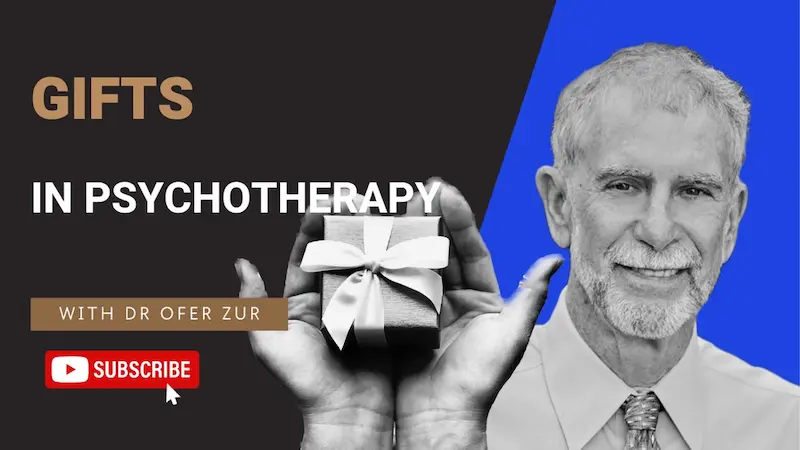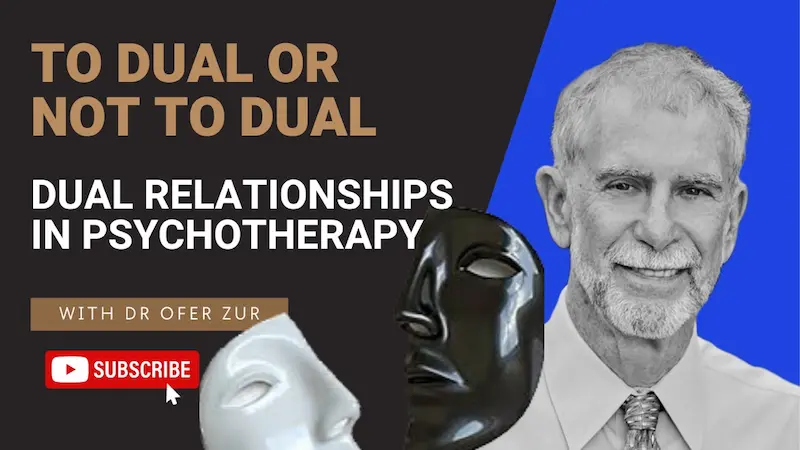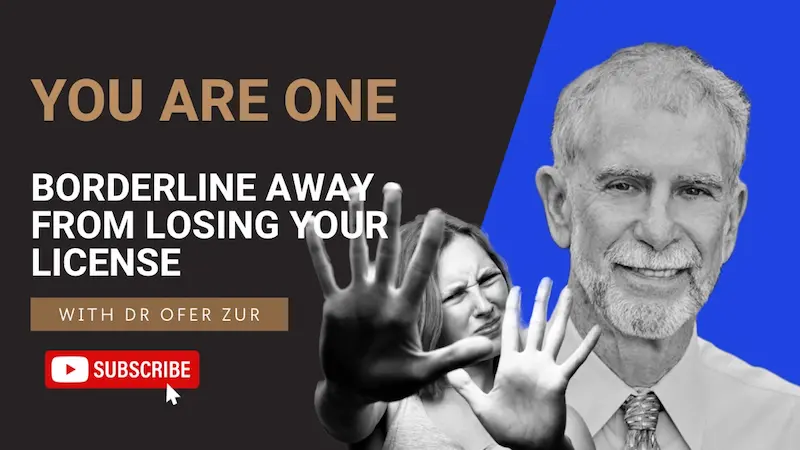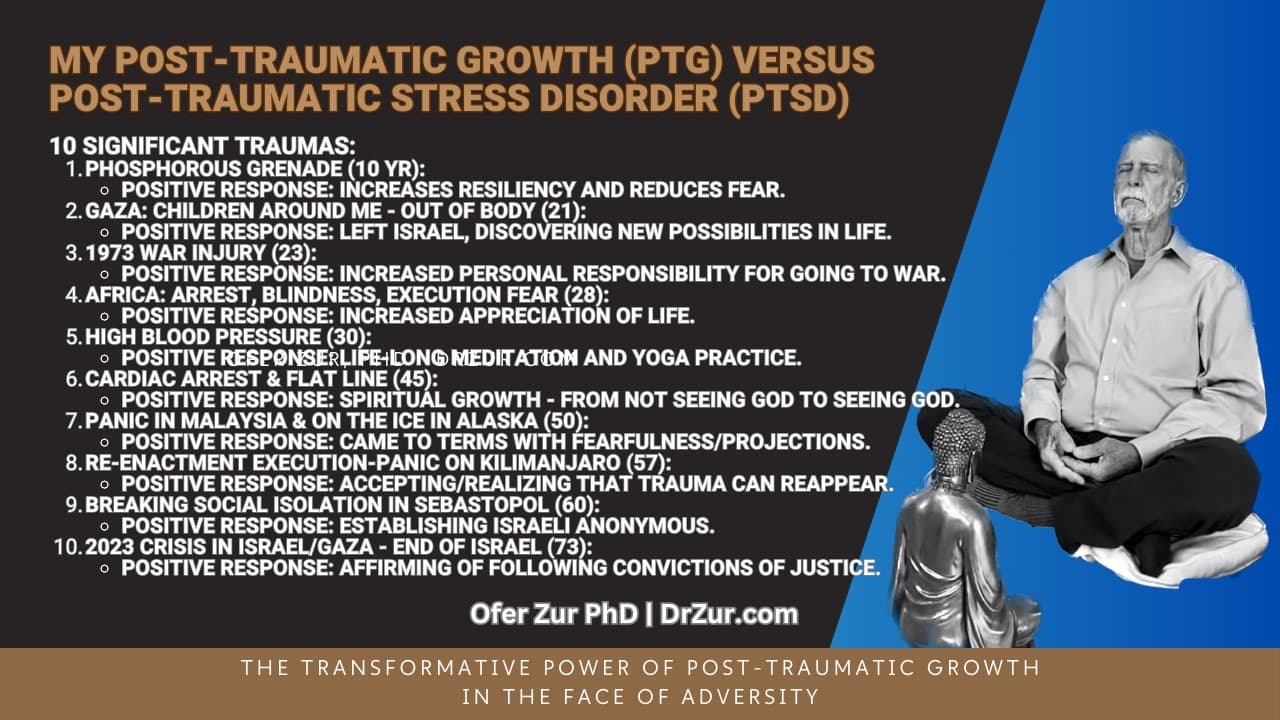Dr. Zur’s Most Favorite Work Organized by Topic
Boundaries & Dual Relationships in Psychotherapy and Counseling
Dying Well Can Help You Live Well - Facing Death ‘Head-On’
The Blessing in Trauma – On Post-Traumatic Growth
Boundaries & Dual Relationships in Psychotherapy and Counseling
Boundaries in Psychotherapy
Dual and Multiple Relationships
Risk of Risk Management, Myths & Faulty Beliefs in Psychology & Psychotherapy and Licensing Boards Protection
Protect Your License From Licensing Board Complaints and malpractice lawsuits
Protect Your License (Youtube)
23 Ways to Protect Your License (PPT)
Board Investigation: Beware, Prepare & Prevail
License: 8 Simple-Doable Ways to Protect It
Licensing Boards' Complaints: Ways to Avoid
Licensing Boards' Investigations
3 Key Ways to Help You Keep Your License
Risk of Risk Management
The Ethical Eye: Don't Let "Risk Management" Undermine Your Professional Approach
Misinformation can damage patient outcomes
The Power of the Borderline (BPD)
The Subsequent Therapist Syndrome:
When Therapists Turn on Their Colleagues
Subsequent Therapist Syndrome - A podcast (Youtube)
The Subsequent Therapist Syndrome
Are Therapists Their Own Worst Enemy?
Subsequent Therapist Reconsidered
Myth, Faulty Beliefs & Controversial topic in Therapy

Critical Look at 12 Myths & Faulty Beliefs in Psychotherapy
11 Faulty beliefs in Counseling and Psychotherapy
Therapists are Their Own Worst Enemies
Reflecting on the 31 Most Controversial Issues in Psychology
Reevaluating the Validity of (forgotten &) Recovered Memories
Rethinking the Myth of Power Differential in Psychotherapy
Rethinking the Myth of Therapists Power Over Their Clients
The false “Inherent Power Differential” Cliché
The Power of the Borderline Patients
Critique of Psychiatric Diagnostic
On Love, Marriage, Affairs, Sexuality & Domestic Violence
Infidelity & Affairs: Myths, Facts & Ways to Respond
Infidelity, unlike what most people assume, is neither rare, an exclusively man’s doing, nor the likely end of the marriage. Almost a third of all marriages may need to confront and deal with the aftermath of extramarital affairs, and the statistics for women are quickly catching up to those of men. Interestingly, infidelity has become an equal opportunity affair.
Jealousy: The Green-Eyed Monster
“Birds do it. Bees do it. Even educated fleas do it.” These words from a popular Cole Porter song speak of the primitive forces generating romantic love, forces which provide tasty morsels for the perhaps equally powerful appetite, jealousy. That jealous feeling, can exhibit itself as illogical rage, suspicion, the inability to get beyond an infraction, the impulse to hurt the other, or the urge to simply hide.
Prenuptial Check List
Getting married is one of the most important decisions you make in your life, so the stakes are too high to leave to your love-crazed judgment. Yet most people fall in love, get engaged and tie the knot. The problem is that men and women make this crucial decision when they are consumed with desire and passion. Something must surely be missing in the process, as more than half of the marriages in the U.S. end up in divorce. Could the missing element be a dose of rationality and clarity?
Fresh look at Sexuality
Transcript of Dr. Zur's interview Dr. Marty Klein a clear-mind, 'straight shooter’, fierce truth seeker Certified Sex Therapist for over 35 years. Dr. Klein has focused his entire career toward a single set of goals: telling the truth about sexuality, helping people feel sexually adequate & powerful, and supporting the wide range of healthy sexual & intimate expression and exploration of women & men...
The Fascinating Controversial Surrogate Partner Therapy: MP3 or Transcript
Surrogate Partner Therapy is a highly unique and equally controversial setting that usually involves a patient, a psychotherapist and a surrogate partner. The 2012 movie, The Sessions, depicts a male-patient in an iron lung, who wishes to loose his virginity, contacts a professional sex surrogate (played beautifully by Helen Hunt).
Re-Thinking the 'System' of Domestic Violence: MP3 or Transcript
Dr. Zur is most known for his effort to humanize the field of psychotherapy and counseling. He is a fierce advocate of appropriate and flexible application of therapeutic boundaries such as touch, self-disclosure, gifts, etc. Through his writing and teaching, he has asserted that rigid application of risk management protocols such as no touch, no self-disclosure, etc., can be harmful to clients as well as being unethical. He has dared to challenge certain almost universally unquestioned positions in the psychological community. All this in an attempt to help free us of the constraints of politically correct thinking. That's interesting, to free us of the constraints of politically correct thinking in order to go more deeply into understanding the forces that create our client's needs and also in order to more adequately address them at multi-levels...
Domestic Violence: Equal Opportunity Offense
Domestic violence is experienced by those in every age group, race, ethnicity, culture, social class and sexual orientation. Intimate partner violence is an equal opportunity phenomenon. Whether the parties involved are in a committed relationship and living in the same home, or just casually dating, violence knows no boundaries. According to recent statistics, the domestic violence problem in the United States may be generating nearly 8 million victims per year. Furthermore, despite what popular opinion may be, the percentage of males abused by their partners is nearing that of women who are victimized within their intimate relationships. Domestic violence is limited neither to heterosexual couples nor to male abusers. Research has shown that bisexual (40%), gay or lesbian adults (27%) are almost twice as likely to experience intimate partner violence as heterosexual adults (16%). It may also come as a surprise and disbelief to many clinicians that almost as many men as women are battered each year.However, men are less likely to end up in the ER or to report domestic violence by their female or male partners for several obvious reasons: shame, machismo or fear of humiliation by police and male peers, etc...
Dying Well Can Help You Live Well - Facing Death 'Head-On'
Honoring the Transition
I am not sure when my goodby (ready to die) party will take place, 1 month from now, 1 year, 10 years or ...This is my 'ready to go' invitation..... I love my life, how I have lived, the choices I've made, even my conscious choice of words I used and phrases I refused to use—admittedly with very little regard to what many of you thought, felt or considered inappropriate, impolite, uncivil, or worse...
Embracing Death to Live Fully Interview: MP3 or Transcript
Today's show is “What death can teach us about living fully,” with maverick psychologist Dr. Ofer Zur. Dr. Zur is quite simply the most fascinating person I know. His career has included being an oceanographer, studying and combating malnutrition in East Africa, and for the past twenty-two years doing psychotherapy, leading seminars, and developing more than a hundred online continuing education courses for health care professionals...
Pondering on Death and Preciousness of Life
Many people have asked me whether the Kilimanjaro trip, jumping from planes, scuba diving, backpacking on glaciers, or riding motorcycles to the highest rideable road in the world in the Himalayas, etc., are exercises in defying death. (See also my complete pictorial biography.) My wife, at times, has described me as cautiously death defying...
A refreshing (deadly) view of Death
I learned a great deal about different attitudes towards life and death during the time I spent in remote areas of the Somali desert...
This Moment Could be My Last
We survived, at least physically, the crossing of the bridge over the Suez Canal under rain of fire and the close call with the monkey aiming the artillery on us. Getting closer to our target city of Ismailia, my buddy and I were driving a jeep on a mission in coordination with a sister unit when we lost our bearings and shockingly found ourselves behind enemy lines...
Dying Well: Forethought, Consciousness, Planning, Joy & More
Alongside the question of 'what is next in my life?', I ponder 'how do I want to die?’. I know that I neither want to die 'erect' (i.e. in my prime) as my mother did, nor do I wish to go through the lengthy, painfully slow journey that my father took in the final period of his life...
Buying into my own Bullshit about "A Glamorous Place to Die"
As Eitan and I were training for the Kilimanjaro climb, many friends and acquaintances confronted me. They wanted to know why at the age of 57, after having suffered a major cardiac arrest, I was so keen on risking my life with this climb of Mt. Kilimanjaro alongside my 14-year-old son...
On Dying Well
What is it like to face death in the 21st Century, considering technology and medicine, expectations at the end of life and how death is empirically out of reach?
The Blessing in Trauma – On Post-Traumatic Growth
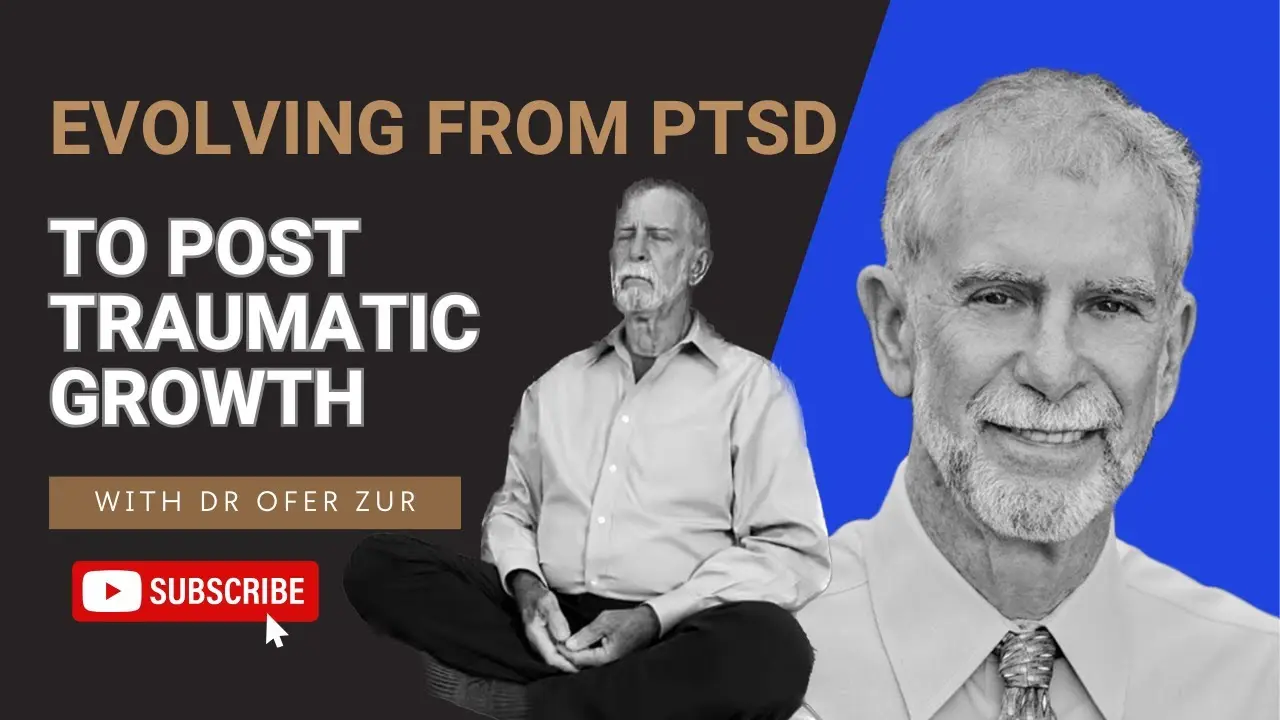
Evolving from PTSD to Post Traumatic Growth
Post-traumatic growth differs from resilience in that it goes beyond bouncing back; it involves reflection, personal growth, and a fundamental shift in perspective. Resilience is the ability to recover, while PTG is about evolving beyond survival. Dr Zur discusses the five categories of growth that survivors of trauma often experience over time.
Post-Traumatic Growth (PTG)
There has been a great deal of research and attention directed toward recovering from PTSD and trauma. However, psychology has been slow to explore the possibility of post-traumatic growth (PTG). For too long, treatment of PTSD and other trauma-related disorders were left out of the growing movement toward strength-based psychology. The focus of treatment remained on recovery more than growth. In recent years, however, PTG has been attracting more and more attention...
Post Traumatic Growth - Podcast Interview
Israeli psychologist Dr. Arnon Rolnick interviews Dr. Ofer Zur.
Direct link to recording
Blessing in Disguise: Post-Traumatic Growth
With PTSD on the rise and increasing levels of trauma being reported today, clinicians face a challenge not just to present clients with treatment modalities that can help them return to their daily lives, but also give them hope for the future. Historically, therapeutic treatment approaches have focused on the problems and impairments clients present with, and in doing so have overlooked the tremendous opportunity for clients to experience growth, resilience and increased meaning as they heal from major trauma...
My Post-Traumatic Growth Journey (PTG Vs. PTSD)
10 Significant Traumas:
- Phosphorous grenade (10 y.o.)
Positive Response: Increase resiliency – and reduces fear - Gaza: Children around me- Out of body (21 y.o.)
Positive Response: Left Israel - Discovering new possibilities in life. - 1973 war injury (23 y.o.)
Positive Response: Increased Personal responsibility for going to war - Africa: Arrest, blindness, execution fear (28 y.o.)
Positive Response: Increased appreciation of life - High Blood pressure (30 y.o.)
Positive Response: Life-long Meditation and Yoga practice - Cardiac arrest & Flat line (45 y.o.)
Positive Response: Spiritual Growth - Didn’t see God to seeing God - Panic in Malaysia & on the ice in Alaska (50 y.o.)
Positive Response: Came to terms with my fearfulness/projections - Re-enactment execution-panic on Kilimanjaro (57 y.o.)
Positive Response: Accepting/realizing that trauma can re-appear - Breaking social Isolation in Sebastopol (60 y.o.)
Positive Response: Deeper relationships w/ friends & Israeli Anonymous - 2023 crisis in Israel/Gaza End of Israel (73 y.o.)
Positive Response: Affirming of following my convictions of justice
Re-Thinking ‘Don’t Blame the Victim' and Guilt
Culture of Victims
We have become a nation of victims, where everyone is leapfrogging over each other, competing for the status of victim, where most people define themselves as some sort of survivor. We live in a culture where more and more people are claiming their own holocaust. While some victims are truly innocent (i.e., the child who is being molested, a victim in the other car in a drunk driving accident), most violence involves some knowledge, familiarity or intimacy between victims and victimizers...
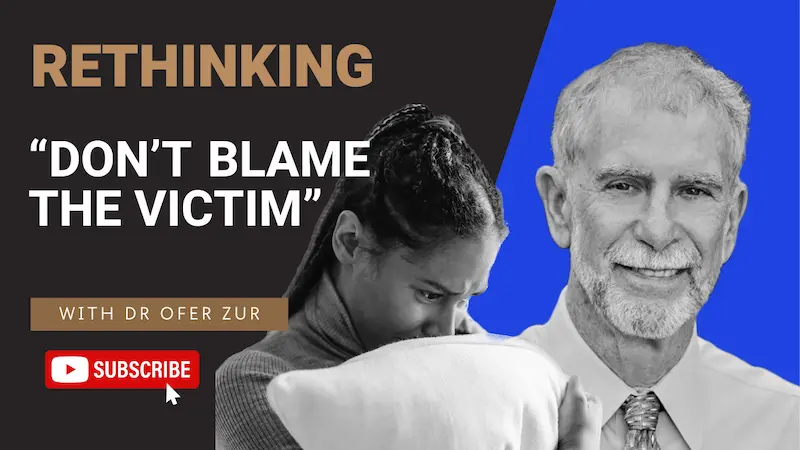
Rethinking "Don't Blame the Victim": The Psychology of Victimhood
The psychology of victims and the dynamics of victimhood have been largely ignored by scholars and clinicians. While in past years the tendency has been to blame victims, more recently the tide has turned. It is now politically incorrect to explore the role of victims in violent systems, as exploring the psychology of victims has become synonymous with blaming the victim...
Rethinking Victimhood MP3 or Transcript
Everybody is framing everything in terms of PTSD and trauma. Everybody has their own little holocaust of some sort. Moving around the world we see what is perhaps trauma. My grandparents died in the holocaust so I have a strong relationship, identity relationship, to what is traumatic and what is true holocaust.
We lose track of that for many reasons. One of them is a self-serving reason as psychologists, when we call everything PTSD. There are cultural issues, there are personal issues, there are educational issues around resilience, how much the culture is oriented to its meaning, the spiritual belief of the culture, as well as economic forces, such as what we see in the psychology profession calling everything PTSD because they can gain so much financial economic benefits (and so does the pharmaceutical companies too)...
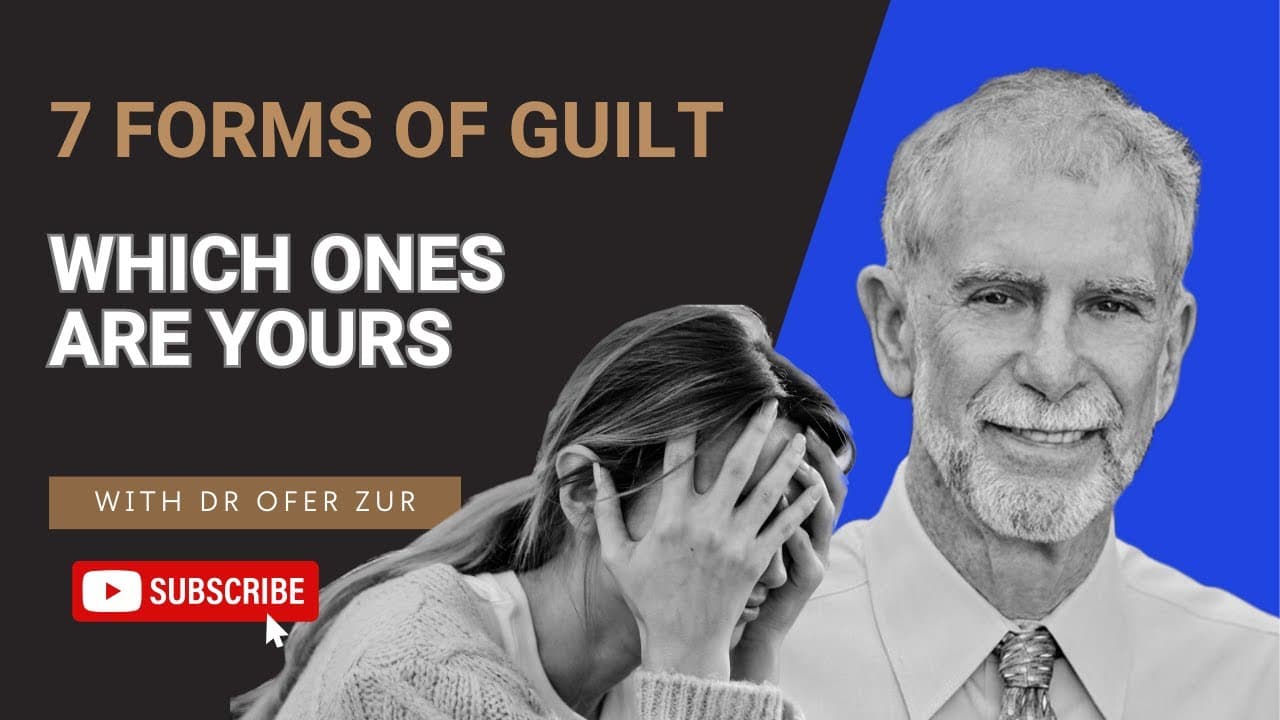
7 Forms of Guilt: Which One is Yours
Welcome to a thought provoking journey into the 7 Forms of Guilt with Dr. Ofer Zur, PhD. As a licensed psychologist, ethicist, instructor, expert witness, and author of 5 books and numerous articles, Dr. Zur brings a unique anthropological perspective to the understanding of guilt.
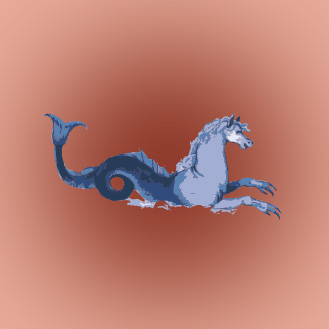
Myths We All Live By
Youtube Videos
Main Myths or Faulty Beliefs We Live By: Victim are Always Innocent,Follow your Instincts, Infidelity is Rare & Death is to be Avoided at all cost
4 Next Myths: Occupation Vs. Vocation, On 5 Types of Guilt, Rethinking Trauma, Curse of Beauty
Meaning of Dis-Ease & Are Memories Real?
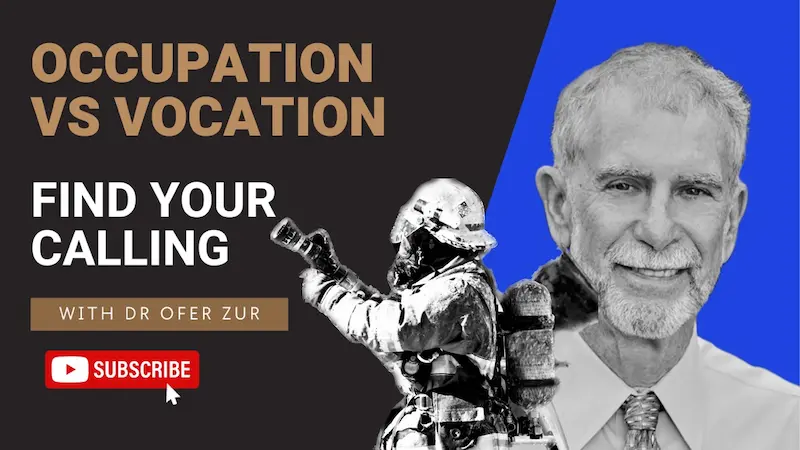 Occupation vs. Vocation: Find Your True Calling
Occupation vs. Vocation: Find Your True Calling
On Power & Boundaries
Dr. Zur's YouTube Channel
Faulty Public-Social Faulty Beliefs
Faulty Beliefs in Psychotherapy & Mental Health Services
Love of Hating: Psychology of War & The Myth of the "Warrior & the Beautiful Soul"
The Love Of Hating: The Psychology Of Enmity
The events of September 11, 2001, have demonstrated the power of enmity. Nineteen suicidal terrorists willingly and knowingly gave up their lives and took away those of their enemies, for what they believed was a just cause. These events also illustrate how the global threat of nuclear war has shifted to include all out terrorism. They blasted Americans into the 21st century, shattering the entrenched myth that technology and safe borders can keep America, the last remaining super power, secure...
Re-Thinking the Role of Women in the Making of War
While in everyday life men and women are split off from each other and from crucial aspects of themselves, war is the ultimate splitting of human from human. War also separates the population along sex lines, and in that respect it resembles childbirth. In war, women are traditionally excluded from the military; in birthing, men were until recently excluded from the birthrooms. Also, to make nuclear war possible, our society splits the most fundamental material of existence – the atom – and so, as Albert Einstein predicted, “we drift toward unparalleled catastrophe.” The nuclear threat brings urgency to the way we view warmaking, and the double-edged pain of sexism brings urgency to the way we view women and men...
Discovering the Power of Women on the Male Psyche
As we were waiting to be deployed, I noticed that almost all my fellow officers were impatient to engage in battle even though it was clear that doing so was likely to result in high casualties to our unit – and, of course, to ourselves. In fact, some men even tried to exert influence on the high command to get us deployed. Believing that the war could have been prevented, I was more ambivalen...
Rethinking the Myth of the "Warrior and the Beautiful Soul"
The fascinating and surprising revelation of the invisible yet powerful presence of women among us heroic paratroopers has stayed with me for a long time. Years later, when I 'converted' to psychology, I chose to explore the intriguing psychological complexities of relationships between men, women and war. Studying the commonly held beliefs, such as "men are more violent than women," "women are the peaceful gender," or "if women were running the world there would be no war," and being aware of my contradictory experience with my paratrooper unit gave birth to my doctoral dissertation, as well as to more extensive post doctorate research...
Israel - On Leaving the Home-Land
Israel Gaza Boarder Visit | Delivering My Apology 2024 - YouTube

Israel | Gaza | Palestine 2023: Conflict & Proposed Resolution
Gaza - Israel Conflict & Resolution 6/2024
Civil Dialogue on Uncivil Middle-East 2024: Israel, Gaza and the "New" Anti-Semitism
Reflecting on the Oc/2023 crisis in Israel and Gaza, Dr. Zur gave a presentation in Sonoma, CA on the complexities involved in the Middle East and offered some ideas of how to resolve the intense conflict.
Dr. Zur Ap/2024 PresentationDr. Zur's Presentation 6/2024
Sonoma Index Tribune Article
Out-Of-Body Experience & Its Life-Long Meaning
Then, as a 20 year old, still in the army, I was serving in the occupied Gaza Strip when I found myself, with eight of my soldiers, surrounded by a rapidly advancing, rock throwing crowd of young Gazans. For a split second, I had an out-of-body experience where I saw the scene from high above.
The 4th Choice: On Leaving Israel
Years later, during a return visit to Israel in 1990, I was interviewed by the editor of "Chotam", an Israeli newsletter, to discuss my culturally unpopular decision (at that time) to leave the country I loved (and still do), Israel...
I was her
Before exploring 'life after leaving,' I want to revisit my time in Israel in the early 70s as an officer in the Israeli army. Our highly trained unit was stationed in a tremendously overcrowded, poverty-stricken, and polluted refugee camp...
Vocation-Calling, Health, Psychology in the Movies, Miscellaneous & Out-of-the-Box Ideas
Psychotherapeutic Ethics in Popular Movies & TV series
This is one of the most detailed and extremely extensive list of popular movies and TV series that cover the following 4 major psychotherapy-clinical psychological-ethical categories:
- Ethical boundary crossings
- Boundary violations by therapists
- Violations by patients
- Psychologists risking the the life of their patients.
This page details 70+ movies' descriptions and growing (you can contribute) that fall into 17 different ethical categories.
Therapeutic Themes in Popular Movies
Movies affect many of us powerfully because the combined impact of images, music, dialogue, lighting, sound and special effects can elicit deep feelings and help us reflect on our lives. They can help us to better understand our own lives, the lives of those around us and even how our society and culture operate. They can shed light on political and spiritual matters too and can provide catharsis and perspective and may open our eyes to new ways of thinking, feeling and pursuing our lives.
Beauty: Does the Mirror Really Know Who’s the Fairest?
Throughout time there have been many conceptualizations of beauty. From each different field of study and from every different culture and perspective, beauty can be given unique description and definition…. So you think beauty is in the eye of the beholder? Think again. According to new research from the University of Exeter in Great Britain, the preference for pretty faces over ugly ones is embedded in our brains from the moment of birth and possibly prior to birth.
Major Issues Facing Teenagers
This page addresses some of the most important issues facing our teenagers at this time. These include teen suicide, teen violence, cyberbullying (online bullying), Internet & online addiction, teens and sex, teens and substance abuse, teen anorexia and eating disorders, violent video games, teans watching porn, TV violence, violence at home, & violent culture. Parents, teachers and communities across the country are concerned with teen issues, which are caused by a number of social, cultural, technological, communal, economic, familial, and individual factors...
Occupation vs. Vocation: Find Your True Calling
Differentiate your occupation, or what you do for living or earn $, from what you are wish or desire to do because you you like it, it gives you pleasure, you feel you are called to do or you believe the world or your community need it.
Beyond 'Work' & Occupation: Find you Calling or Vocation
The search for your calling or vocation is different from identifying an occupation. While occupation has more to do with earning money, paying the rent or satisfying one’s ego or pride, vocation or calling are tied to one’s sense of meaning and life-purpose. As people age and mature, the search for meaningful life and fulfilling one’s calling become more important.
On Health & Wellness
Health is cultivating that which is best in us in order to live life joyfully, intentionally, consciously, morally, and well. Healthy life often involves connections to other people, personal meaning, and thoughtful attention to one’s body, mind, and spirit, as well as to one’s community and the world. It also requires making conscious choices that support our optimal well being throughout each phase of life, including our attitude towards death and dying.
The Crater Dilemma: Instinct vs. rational & impulse vs. logics
As a young paratrooper in the midst of a war, I have a vivid memory of being deep in a sandy desert in the midst of an intense lethal downpour of enemy artillery shells. Each exploding shell created a crater in the sand. I was standing at the edge of one of these craters, covered with dust from the latest explosion. Obviously, my instinct urged me to run for my life; to run as fast as I could away from that crater before the next shell struck, but my military training repeatedly ran through my head, telling me that “bombs never strike the same spot twice”.
Evacuations Wonders: The Blessing in Wild Fire Storms
Evacuation orders were inching in. The cellphone text alerts gradually progressed from "Evacuation Advisory" to "Evacuation Mandatory." In between, there was enough time to consciously or unconsciously, wittingly or unwittingly contemplate the evacuation 'wonders,' considerations and choices...
Appropriate-Healthy Guilt: When I Was Her
Before exploring 'life after leaving,' I want to revisit my time in Israel in the early 70s as an officer in the Israeli army. Our highly trained unit was stationed in a tremendously overcrowded, poverty-stricken, and polluted refugee camp in the occupied Gaza Strip. The camp consisted of thousands of single-story houses jammed full with multiple generations in families, and often chickens and ducks as well!
